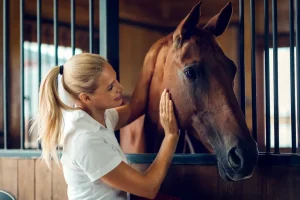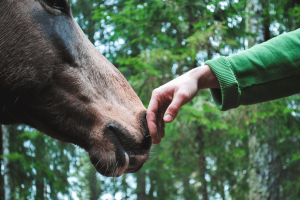Horses have captivated humans for centuries, serving as transportation, companions in leisure activities, and participants in sports. But beyond their contributions to human society, their genetic composition is equally fascinating. Have you ever wondered about the number of chromosomes in a horse? This article will delve into equine genetics to uncover the answer and explore the intricate world of horse chromosomes.
Seemore: Can Horses Eat Grapes? – All Important Things You Should Know
Contents
What are Chromosomes?
Before exploring horse chromosomes specifically, let’s understand what chromosomes are. Chromosomes are thread-like structures located in the nucleus of every cell. They carry DNA, the genetic blueprint that determines an organism’s traits and physical characteristics. Chromosomes are fundamental to the growth, development, and proper functioning of all living beings.
For comparison:
- Humans have 46 chromosomes (23 pairs).
- Domestic dogs have 78 chromosomes (39 pairs).
- Horses possess a unique number of chromosomes compared to many mammals, making them particularly intriguing.
So, how many chromosomes does a horse have? Let’s find out. https://hearttohorses.com
The Number of Chromosomes in a Horse
The domestic horse, Equus caballus, belongs to the Equidae family, which includes donkeys and zebras. Horses have a total of 64 chromosomes (32 pairs) in each cell. This sets them apart as one of the few mammals with an odd total number of chromosomes.
![]()

Within the Equidae family:
- Donkeys have 62 chromosomes.
- Zebras can have 32–46 chromosomes, depending on the species.
This unique genetic makeup emphasizes horses’ distinct place in the animal kingdom.
Types of Horse Chromosomes
Horses’ 64 chromosomes are divided into:
- 32 pairs of autosomes: These govern the horse’s overall physical development and bodily functions.
- 1 pair of sex chromosomes: These determine the horse’s gender. Female horses have two X chromosomes (XX), while males have one X and one Y chromosome (XY).
Each chromosome pair is inherited from the parents, one from the mother and one from the father. This recombination during reproduction promotes genetic diversity and results in unique offspring.
![]()
![]()

Genetic Disorders in Horses
Like other living organisms, horses can suffer from genetic disorders caused by chromosomal abnormalities.
- Lethal White Syndrome (LWS): A disorder caused by mismatches in chromosome 5 from both parents. Foals with LWS are born with white coats and severe intestinal abnormalities, leading to death within days.
- Hereditary Equine Regional Dermal Asthenia (HERDA): Caused by a mutation on chromosome 2, this condition results in fragile skin prone to tearing, causing discomfort and pain.
Awareness of these conditions helps breeders make informed decisions, reducing the prevalence of such disorders.
The Evolution of Horse Chromosomes
Over millions of years, horses’ chromosomes have evolved through natural selection. Early horse ancestors, such as Hyracotherium, had 66 chromosomes, compared to the modern horse’s 64.
These evolutionary changes are thought to enhance genetic diversity, equipping horses with adaptive traits for survival.
![]()

Hybridization and Chromosomes
Hybridization involves crossing different species to produce offspring with mixed genetic traits. In horses, this includes mating with zebras or donkeys.
However, hybrids often face chromosomal mismatches, leading to infertility or other issues. For example:
- Mules: The offspring of a horse and donkey inherit uneven chromosome sets, making them sterile.
- Zorses: Zebra-horse hybrids face similar challenges due to mismatched chromosomes.
FAQs
Q: Can horses have an odd number of chromosomes?
Yes, horses are among the few mammals with an odd total number of chromosomes—64.
Q: Do all Equidae family members have the same chromosome count?
No, chromosome numbers vary within the family. Donkeys have 62, while zebras have 32–46, depending on the species.
Q: What are common genetic disorders in horses?
Genetic disorders include Lethal White Syndrome (LWS) and Hereditary Equine Regional Dermal Asthenia (HERDA), both linked to chromosomal abnormalities.
Q: How have horse chromosomes evolved over time?
Scientists believe horse chromosomes evolved to promote genetic diversity and adaptability, transitioning from 66 chromosomes in ancient ancestors to 64 today.
Q: What happens when horses hybridize with donkeys or zebras?
The resulting hybrids (e.g., mules or zorses) often inherit mismatched chromosomes, causing infertility or other genetic complications.
Conclusion
Horses have 64 chromosomes, setting them apart in the animal kingdom. These chromosomes are crucial for their physical traits and overall health. Understanding their genetic makeup not only answers questions about their biology but also helps in responsible breeding and preserving their species.
Equine genetics remains a captivating field, unlocking the mysteries behind these majestic animals and their evolutionary journey.
